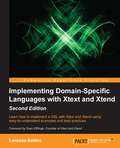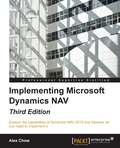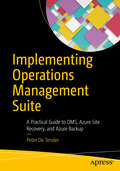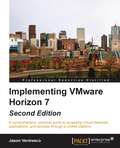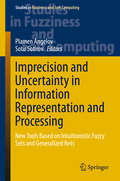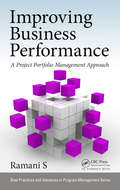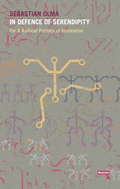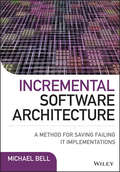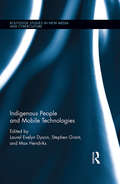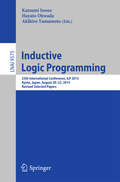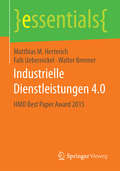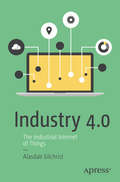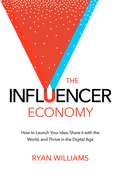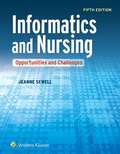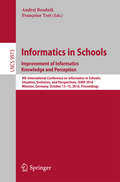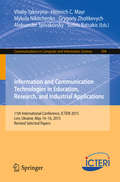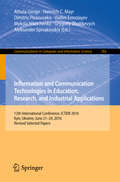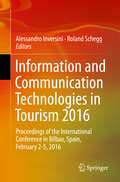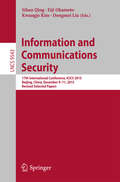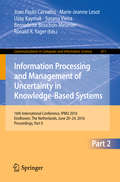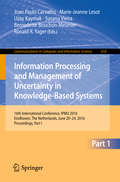- Table View
- List View
Implementing Domain-Specific Languages with Xtext and Xtend - Second Edition
by Lorenzo BettiniLearn how to implement a DSL with Xtext and Xtend using easy-to-understand examples and best practices About This Book * Leverage the latest features of Xtext and Xtend to develop a domain-specific language. * Integrate Xtext with popular third party IDEs and get the best out of both worlds. * Discover how to test a DSL implementation and how to customize runtime and IDE aspects of the DSL Who This Book Is For This book is targeted at programmers and developers who want to create a domain-specific language with Xtext. They should have a basic familiarity with Eclipse and its functionality. Previous experience with compiler implementation can be helpful but is not necessary since this book will explain all the development stages of a DSL. What You Will Learn * Write Xtext grammar for a DSL; * Use Xtend as an alternative to Java to write cleaner, easier-to-read, and more maintainable code; * Build your Xtext DSLs easily with Maven/Tycho and Gradle; * Write a code generator and an interpreter for a DSL; * Explore the Xtext scoping mechanism for symbol resolution; * Test most aspects of the DSL implementation with JUnit; * Understand best practices in DSL implementations with Xtext and Xtend; * Develop your Xtext DSLs using Continuous Integration mechanisms; * Use an Xtext editor in a web application In Detail Xtext is an open source Eclipse framework for implementing domain-specific languages together with IDE functionalities. It lets you implement languages really quickly; most of all, it covers all aspects of a complete language infrastructure, including the parser, code generator, interpreter, and more. This book will enable you to implement Domain Specific Languages (DSL) efficiently, together with their IDE tooling, with Xtext and Xtend. Opening with brief coverage of Xtext features involved in DSL implementation, including integration in an IDE, the book will then introduce you to Xtend as this language will be used in all the examples throughout the book. You will then explore the typical programming development workflow with Xtext when we modify the grammar of the DSL. Further, the Xtend programming language (a fully-featured Java-like language tightly integrated with Java) will be introduced. We then explain the main concepts of Xtext, such as validation, code generation, and customizations of runtime and UI aspects. You will have learned how to test a DSL implemented in Xtext with JUnit and will progress to advanced concepts such as type checking and scoping. You will then integrate the typical Continuous Integration systems built in to Xtext DSLs and familiarize yourself with Xbase. By the end of the book, you will manually maintain the EMF model for an Xtext DSL and will see how an Xtext DSL can also be used in IntelliJ. Style and approach A step-by step-tutorial with illustrative examples that will let you master using Xtext and implementing DSLs with its custom language, Xtend.
Implementing Microsoft Dynamics NAV - Third Edition
by Alex ChowExplore the capabilities of Dynamics NAV 2016 and discover all you need to implement it About This Book * Learn the key roles of your Dynamics NAV partner and the roles within your customer's organization * Create configuration packages and perform data migration on your own * Find out how to troubleshoot your problems effectively with your Dynamics NAV partner Who This Book Is For This book is for Dynamics NAV partners and end users who want to know everything about Dynamics NAV implementations. It is aimed at those who want to be project managers or get involved with Dynamics NAV, but do not have the expertise to write code themselves. What You Will Learn * Study the roles within a Dynamics NAV partner and within a customer's company * Create reusable data migration packages * Work with the debugger to pinpoint error messages * Get to grips with the key tables used in data reporting and analysis * Successfully upgrade your installation to the latest version * Manage and expand your existing installation with additional functionalities * Explore the free third-party add-ons that can leverage your existing installation In Detail Microsoft Dynamics NAV 2013 is an Enterprise Resource Planning (ERP) application used in all kinds of organizations around the world. It provides a great variety of functionality out-of-the-box in different topics such as accounting, sales, purchase processing, logistics, or manufacturing. It also allows companies to grow the application by customizing the solution to meet specific requirements. This book is a hands-on tutorial on working with a real Dynamics NAV implementation. You will learn about the team from your Microsoft Dynamics NAV partner as well as the team within the customer's company. This book provides an insight into the different tools available to migrate data from the client's legacy system into Microsoft Dynamics NAV. If you are already live with Microsoft Dynamics NAV, this books talks about upgrades and what to expect from them. We'll also show you how to implement additional or expanding functionalities within your existing Microsoft Dynamics NAV installation, perform data analysis, debug error messages, and implement free third-party add-ons to your existing installation. This book will empower you with all the skills and knowledge you need for a successful implementation. Style and approach This book is step-by-step guide to implementing Dynamics NAV from start to finish.
Implementing Operations Management Suite
by Peter De TenderLearn how to protect, back up, recover, and monitor your data and infrastructure in the cloud with Microsoft's Operations Management Suite (OMS), Azure Backup, and Azure Site Recovery.Implementing Operations Management Suite starts with an overview of the Operations Management Suite, followed by an introduction to Azure virtual machines and virtual networks. Chapters cover Azure Backup and how to configure it, followed by deep dives into aspects of Azure Site Recovery (ASR): how it works, how to configure it, how to streamline your disaster recovery failover from on-premises to Azure, and so on. Learn about protection groups, how to perform planned and unplanned failover, and more. Windows IT pro consultant, trainer and MVP Peter De Tender takes you through the necessary theory and background on each topic along with hands-on step-by-step lab guides to help you implement and configure each feature for yourself. You’ll also find out how to estimate your platform costs when using Azure infrastructure components, making this book your one-stop guide to the latest disaster recovery services in Microsoft Azure. What You'll LearnUnderstand current concepts and challenges in IT disaster recoveryGet introduced to Microsoft Azure, Azure virtual networks and Azure virtual machinesProtect your data in the cloud with Azure Backup, and the configuration options availableUnderstand how to protect, recover, and monitor your environment with Azure Site Recovery Manager, and the configuration options availableExtend Azure Site Recovery Manager to non-Hyper-V workloadsWho This Book Is ForIT professionals and IT decision makers who are interested in learning about Azure backup and Azure Site Recovery Manager in order to build and/or optimize their IT disaster recovery scenarios.
Implementing VMware Horizon 7 - Second Edition
by Jason VentrescoA comprehensive, practical guide to accessing virtual desktops, applications, and services through a unified platform About This Book * This is the first book on the market that delivers desktops and applications through a single Virtual Desktop Infrastructure platform * Reduce enterprise costs by dynamically allocating resources with virtual storage, compute and networking * This comprehensive guide provides simplified operations, improved security, and accelerated time-to-value using VMware Horizon 7 Who This Book Is For If you are a newcomer to system administration, and you wish to implement the Horizon environment, then this book is for you. Prior knowledge of Horizon is beneficial. What You Will Learn * Walk through the configuration of VMware Horizon, including the new Horizon Access Point appliance * Implement a multi-site VMware Horizon pod using the Cloud Pod Architecture feature * Understand the integration between VMware Horizon and VSAN, and see how they are deployed together * Explore how to implement and maintain Microsoft RDS and Linux and Windows Desktop Pools Create and optimize desktop master images. * Understand how to manage the SSL certificates for each of the VMware Horizon components. In Detail VMware Horizon 7 has been a buzz since it was announced. One of the major reasons is the introduction of the new Instant Clones feature. This book will complement the product documentation by providing real-life examples of how it is implemented along with the latest features and components of the platform. We'll explore the latest features of the platform, including those added through product acquisitions such as User Environment Manager and App Volumes. Further on, you will also be introduced to the new capabilities added to the core product such Linked-Clone RDS pools. Upon completion of this book, you will have an understanding of the capabilities and benefits VMware Horizon can provide to your organization, and how each of its components are implemented. Style and approach This comprehensive guide focuses on the practicality of VMware Horizon and how you can implement it in your organization.
Imprecision and Uncertainty in Information Representation and Processing
by Sotir Sotirov Plamen AngelovThe book offers a comprehensive and timely overview of advanced mathematical tools for both uncertainty analysis and modeling of parallel processes, with a special emphasis on intuitionistic fuzzy sets and generalized nets. The different chapters, written by active researchers in their respective areas, are structured to provide a coherent picture of this interdisciplinary yet still evolving field of science. They describe key tools and give practical insights into and research perspectives on the use of Atanassov's intuitionistic fuzzy sets and logic, and generalized nets for describing and dealing with uncertainty in different areas of science, technology and business, in a single, to date unique book. Here, readers find theoretical chapters, dealing with intuitionistic fuzzy operators, membership functions and algorithms, among other topics, as well as application-oriented chapters, reporting on the implementation of methods and relevant case studies in management science, the IT industry, medicine and/or education. With this book, the editors wish to pay homage to Professor Krassimir Todorov Atanassov for his pioneering work on both generalized nets and intuitionistic fuzzy set.
Improving Business Performance: A Project Portfolio Management Approach (Best Practices in Portfolio, Program, and Project Management)
by Ramani SNo organization is impervious to change. Rather, the survival and growth of an organization is dependent on how well it copes with change. Successful change initiatives consist of the integrated eco-system of its portfolio, programs, and projects. These change initiatives become the delivery mechanisms for implementing the strategy of an organization.Improving Business Performance: A Project Portfolio Management Approach clarifies how the proper application of portfolio, program, and project management concepts can help commercial and non-profit organizations achieve their strategic objectives. Most organizations have been good at devising strategy, but falter during its implementation. Executing strategy well to deliver superior business performance remains a key challenge, which is addressed as the core theme of this book.The book portrays a top-down orientation as well as a bottom-up integration of change initiatives to facilitate alignment to strategy and accommodate mid-course changes. It takes into account existing global best management practices to bring forth an approach that is customizable and useful to organizations in any industry.Describing why portfolio management lies at the apex of change initiative management, the book explains how to design and fine-tune portfolios so they are in alignment with your organization’s overall strategy and business needs. After reading this book, you will understand: How to design the project portfolio structure for your organization How to integrate programs and projects within the portfolio more effectively How to better manage interactions across diverse change initiatives How to maintain focus while managing change to realize benefits The book presents a case study that illustrates the application of project portfolio concepts in practical scenarios. It includes chapters dedicated to transition management, change management, benefits management, and the Enterprise Project Management Office. It also includes templates you can immediately put to use in your own portfolios, programs, and projects.
In Defence of Serendipity
by Seb OlmaIn Defence of Serendipity is a lively and buccaneering work of investigative philosophy, treating the origins of "serendipity, accident and sagacity", both as riddles and philosophical concepts that can be put to a future political use. Taking in Aristotle, LSD, Tony Blair and techno-mysticism, Olma challenges the prevailing faith in the benevolence of digital technology and the illegitimate equation of innovation and entrepreneurship, arguing instead that we must take responsibility for the care of society's digital infrastructure, and prevent its degeneration into an apparatus of marketing and finance. For although there is nothing wrong with marketing and finance per se, if they alone lead technological development, free of any discretionary political interference, the freedom to be exploited will be as much a part of the future as our ability to intervene freely in our lives, will be a thing of the past.
Incremental Software Architecture
by Michael BellThe best-practices solution guide for rescuing broken software systems Incremental Software Architecture is a solutions manual for companies with underperforming software systems. With complete guidance and plenty of hands-on instruction, this practical guide shows you how to identify and analyze the root cause of software malfunction, then identify and implement the most powerful remedies to save the system. You'll learn how to avoid developing software systems that are destined to fail, and the methods and practices that help you avoid business losses caused by poorly designed software. Designed to answer the most common questions that arise when software systems negatively impact business performance, this guide details architecture and design best practices for enterprise architecture efforts, and helps you foster the reuse and consolidation of software assets. Relying on the wrong software system puts your company at risk of failing. It's a question of when, not if, something goes catastrophically wrong. This guide shows you how to proactively root out and repair the most likely cause of potential issues, and how to rescue a system that has already begun to go bad. Mitigate risks of software development projects Increase ROI and accelerate time-to-market Accurately assess technological achievability and viability Identify actual software construction value propositions Fierce competition and volatile commerce markets drive companies to invest heavily in the construction of software systems, which strains IT and business budgets and puts immense strain on existing network infrastructure. As technology evolves, these ever-more-complex computing landscapes become more and more expensive and difficult to maintain. Incremental Software Architecture shows you how to revamp the architecture to effectively reduce strain, cost, and the chance of failure.
Independent Politics
by Samara Klar Yanna KrupnikovThe number of independent voters in America increases each year, yet they remain misunderstood by both media and academics. Media describe independents as pivotal for electoral outcomes. Political scientists conclude that independents are merely 'undercover partisans': people who secretly hold partisan beliefs and are thus politically inconsequential. Both the pundits and the political scientists are wrong, argue the authors. They show that many Americans are becoming embarrassed of their political party. They deny to pollsters, party activists, friends, and even themselves, their true partisanship, instead choosing to go 'undercover' as independents. Independent Politics demonstrates that people intentionally mask their partisan preferences in social situations. Most importantly, breaking with decades of previous research, it argues that independents are highly politically consequential. The same motivations that lead people to identify as independent also diminish their willingness to engage in the types of political action that sustain the grassroots movements of American politics.
Indigenous People and Mobile Technologies (Routledge Studies in New Media and Cyberculture)
by Laurel Evelyn Dyson Stephen Grant Max HendriksIn the rich tradition of mobile communication studies and new media, this volume examines how mobile technologies are being embraced by Indigenous people all over the world. As mobile phones have revolutionised society both in developed and developing countries, so Indigenous people are using mobile devices to bring their communities into the twenty-first century. The explosion of mobile devices and applications in Indigenous communities addresses issues of isolation and building an environment for the learning and sharing of knowledge, providing support for cultural and language revitalisation, and offering the means for social and economic renewal. This book explores how mobile technologies are overcoming disadvantage and the tyrannies of distance, allowing benefits to flow directly to Indigenous people and bringing wide-ranging changes to their lives. It begins with general issues and theoretical perspectives followed by empirical case studies that include the establishment of Indigenous mobile networks and practices, mobile technologies for social change and, finally, the ways in which mobile technology is being used to sustain Indigenous culture and language.
Inductive Logic Programming
by Katsumi Inoue Hayato Ohwada Akihiro YamamotoThis book constitutes the thoroughly refereed post-conference proceedings of the 25th International Conference on Inductive Logic Programming, ILP 2015, held in Kyoto, Japan, in August 2015. The 14 revised papers presented were carefully reviewed and selected from 44 submissions. The papers focus on topics such as theories, algorithms, representations and languages, systems and applications of ILP, and cover all areas of learning in logic, relational learning, relational data mining, statistical relational learning, multi-relational data mining, relational reinforcement learning, graph mining, connections with other learning paradigms, among others.
Industrielle Dienstleistungen 4.0: HMD Best Paper Award 2015 (essentials)
by Matthias M. Herterich Falk Uebernickel Walter BrennerAuf Basis empirischer Daten von 45 konkreten Anwendungsfällen identifiziert dieses essential Nutzenpotentiale cyber-physischer Systeme im Kontext industrieller Dienstleistungen. Die Autoren nennen Implikationen und Handlungsempfehlungen für die Unternehmenspraxis. Die Leser erfahren, wie die fortschreitende Digitalisierung und der geschickte Einsatz cyber-physischer Systeme das Dienstleistungsgeschäft der produzierenden Industrie sowie im Maschinen- und Anlagenbau transformieren. Damit ergeben sich einerseits neue Möglichkeiten zur Effizienzsteigerung bereits bestehender Prozesse. Andererseits eröffnen sich bisher ungeahnte Möglichkeiten zur Umsetzung innovativer, datengetriebener industrieller Dienstleistungen.
Industry 4.0
by Alasdair GilchristExplore the current state of the production, processing, and manufacturing industries and discover what it will take to achieve re-industrialization of the former industrial powerhouses that can counterbalance the benefits of cheap labor providers dominating the industrial sector. This book explores the potential for the Internet of Things (IoT), Big Data, Cyber-Physical Systems (CPS), and Smart Factory technologies to replace the still largely mechanical, people-based systems of offshore locations. Industry 4. 0: The Industrial Internet of Things covers Industry 4. 0, a term that encapsulates trends and technologies that could rewrite the rules of manufacturing and production. What you'll learn What are the Industrial Internet and Industrial Internet of Things Which technologies must advance to enable Industry 4. 0 What is happening today to make that happen What are examples of the implementation of Industry 4. 0 How to apply some of these case studies What is the potential to take back the lead in manufacturing, and the potential fallout that could result Who this book is for Business futurists, business strategists, CEOs and CTOs, and anyone with an interest and an IT or business background; or anyone who may have a keen interest in how the future of IT, industry and production will develop over the next two decades.
The Influencer Economy: How to Launch Your Idea, Share It with the World, and Thrive in the Digital Age
by Ryan Williams<p>Reinvent yourself and grow radical influence. <p>What if you got heard, and became visible in a seemingly noisy online world from day #1 of your new idea? Imagine yourself having a worldwide influence in your industry, profession, or life. What if you could grow universal influence and drive winning collaborations? <p>Ryan Williams is a former standup comedian, author, and podcast host, who for the last three years, on Stories From The Influencer Economy podcast, he interviewed over 100 influencers who have built ideas online such as: Seth Godin, Brad Feld, Derek Sivers, Troy Carter, Jemele Hill, Kevin Kelly and many others. In "The Influencer Economy" he explains how influence is a learned and acquired skill and how your influence can be honed and crafted over time. Williams answers the question: what are the secrets to grow your influence?</p>
Informatics And Nursing: Opportunities And Challenges
by Jeanne SewellInformatics and Nursing: Opportunities and Challenges is a comprehensive informatics text focused on helping the nursing student learn the basics of informatics. The contents proceed from Unit One which covers computer basics to Unit Five which examines skills and techniques for using the end product of informatics: data. The text provides the foundational knowledge to understand technology and use informatics to discover and manipulate information and access, manage, retrieve, and present clinical data. This text was designed to capture cutting-edge advancement in nursing informatics core competencies and applications and to present the theories, tools, and skills that every nurse should know. The new edition has been updated for currency and has had chapters reorganized and consolidated to help students focus on important information.
Informatics in Schools: Improvement of Informatics Knowledge and Perception
by Andrej Brodnik Françoise TortThis book constitutes the refereed proceedings of the 9th International Conference on Informatics in Schools: Situation, Evolution, and Perspectives, ISSEP 2016, held in M#65533;nster, Germany, in October 2015. The 17 full papers presented together with 1 invited talk were carefully reviewed and selected from 50 submissions. The focus of the conference was on following topics: sustainable education in informatics for pupils of all ages; connecting informatics lessons to the students' everyday lives; teacher education in informatics or computer science; and research on informatics or computer science in schools (empirical/qualitative/quantitative/theory building/research methods/comparative studies/transferability of methods and results from other disciplines).
Information and Communication Technologies in Education, Research, and Industrial Applications
by Vitaliy Yakovyna Heinrich C. Mayr Mykola Nikitchenko Grygoriy Zholtkevych Aleksander Spivakovsky Sotiris BatsakisThis bookconstitutes the thoroughly refereed proceedings of the 11th InternationalConference on Information and Communication Technologies in Education,Research, and Industrial Applications, ICTERI 2015, held in Lviv, Ukraine, inMay 2015. The 9 revisedfull papers presented were carefully reviewed and selected from 119submissions. The papers are grouped into two parts: ICT in education andindustrial applications, and formal frameworks.
Information and Communication Technologies in Education, Research, and Industrial Applications
by Athula Ginige Heinrich C. Mayr Dimitris Plexousakis Vadim Ermolayev Mykola Nikitchenko Grygoriy Zholtkevych Aleksander SpivakovskiyThis book constitutes the thoroughly refereed proceedings of the 11th International Conference on Information and Communication Technologies in Education, Research, and Industrial Applications, ICTERI 2015, held in Lviv, Ukraine, in May 2015. The 9 revised full papers presented were carefully reviewed and selected from 119 submissions. The papers are grouped into two parts: ICT in education and industrial applications, and formal frameworks.
Information and Communication Technologies in Tourism 2016
by Alessandro Inversini Roland ScheggThe papers presented in this volume advance thestate-of-the-art research on digital marketing and social media, mobile computingand responsive web design, semantic technologies and recommender systems,augmented and virtual reality, electronic distribution and online travelreviews, MOOC and eLearning, eGovernment and sharing economy. This book coversthe most significant areas contributed by prominent scholars from around theworld and is suitable for both academics and practitioners who are interestedin the latest developments in eTourism.
Information and Communications Security
by Sihan Qing Eiji Okamoto Kwangjo Kim Dongmei LiuThis book constitutes the thoroughly refereed post-conference proceedings of the 17th International Conference on Information and Communications Security, ICISC 2015, held in Beijing, China, in December 2015. The 24 revised full papers and 19 short papers presented were carefully selected from 148 submissions. The papers provide the latest results in research and development in the field of information security and applied cryptology.
Information and Communications Security: 17th International Conference, ICICS 2015, Beijing, China, December 9-11, 2015, Revised Selected Papers (Lecture Notes in Computer Science #9543)
by Sihan Qing Eiji Okamoto Kwangjo Kim Dongmei LiuThis book constitutes the thoroughly refereed post-conference proceedings of the 17th International Conference on Information and Communications Security, ICISC 2015, held in Beijing, China, in December 2015.The 24 revised full papers and 19 short papers presented were carefully selected from 148 submissions. The papers provide the latest results in research and development in the field of information security and applied cryptology.
Information, Freedom and Property: The Philosophy of Law Meets the Philosophy of Technology
by Mireille Hildebrandt Bibi van den BergThis book addresses issues on the nexus of freedom of and property in information, while acknowledging that both hiding and exposing information may affect our privacy. It inquires into the physics, the technologies, the business models, the governmental strategies and last but not least the legal frameworks concerning access, organisation and control of information. It debates whether it is in the very nature of information to be either free or monopolized, or both. Analysing upcoming power structures, new types of colonization and attempts to replace legal norms with techno-nudging, this book also presents the idea of an infra-ethics capable of pre-empting our pre-emption. It discusses the interrelations between open access, the hacker ethos, the personal data economy, and freedom of information, highlighting the ephemeral but pivotal role played by information in a data-driven society. This book is a must-read for those working on the contemporary dimensions of freedom of information, data protection, and intellectual property rights.
Information Politics, Protests, and Human Rights in the Digital Age
by Mahmood MonshipouriWe live in a highly complex and evolving world that requires a fuller and deeper understanding of how modern technological tools, ideas, practices, and institutions interact, and how different societies adjust themselves to emerging realities of the digital age. This book conveys such issues with a fresh perspective and in a systematic and coherent way. While many studies have explained in depth the change in the aftermath of the unrests and uprisings throughout the world, they rarely mentioned the need for constructing new human rights norms and standards. This edited collection provides a balanced conceptual framework to demonstrate not only the power of autonomous communication networks but also their limits and the increasing setbacks they encounter in different contexts.
Information Processing and Management of Uncertainty in Knowledge-Based Systems
by Joao Paulo Carvalho Marie-Jeanne Lesot Uzay Kaymak Susana Vieira Bernadette Bouchon-Meunier Ronald R. YagerThis two volume set (CCIS 610 and 611) constitute the proceedings of the 16th International Conference on Information processing and Management of Uncertainty in Knowledge-Based Systems, IPMU 2016, held in Eindhoven, The Netherlands, in June 2016. The 127 revised full papers presented together with four invited talks were carefully reviewed and selected from numerous submissions. The papers are organized in topical sections on fuzzy measures and integrals; uncertainty quantification with imprecise probability; textual data processing; belief functions theory and its applications; graphical models; fuzzy implications functions; applications in medicine and bioinformatics; real-world applications; soft computing for image processing; clustering; fuzzy logic, formal concept analysis and rough sets; graded and many-valued modal logics; imperfect databases; multiple criteria decision methods; argumentation and belief revision; databases and information systems; conceptual aspects of data aggregation and complex data fusion; fuzzy sets and fuzzy logic; decision support; comparison measures; machine learning; social data processing; temporal data processing; aggregation.
Information Processing and Management of Uncertainty in Knowledge-Based Systems
by Joao Paulo Carvalho Marie-Jeanne Lesot Uzay Kaymak Susana Vieira Bernadette Bouchon-Meunier Ronald R. YagerThis two volume set (CCIS 610 and 611) constitute the proceedings of the 16th International Conference on Information processing and Management of Uncertainty in Knowledge-Based Systems, IPMU 2016, held in Eindhoven, The Netherlands, in June 2016. The 127 revised full papers presented together with four invited talks were carefully reviewed and selected from numerous submissions. The papers are organized in topical sections on fuzzy measures and integrals; uncertainty quantification with imprecise probability; textual data processing; belief functions theory and its applications; graphical models; fuzzy implications functions; applications in medicine and bioinformatics; real-world applications; soft computing for image processing; clustering; fuzzy logic, formal concept analysis and rough sets; graded and many-valued modal logics; imperfect databases; multiple criteria decision methods; argumentation and belief revision; databases and information systems; conceptual aspects of data aggregation and complex data fusion; fuzzy sets and fuzzy logic; decision support; comparison measures; machine learning; social data processing; temporal data processing; aggregation.
